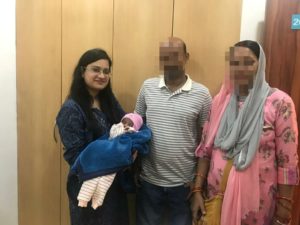The incidence of Female infertility is increasing rapidly because of the modern stressful lifestyle.
Planning for IVF? Let’s discuss the entire IVF process and prepare your journey of Parenthood. Getting pregnant can prove much harder than many anticipate. In fact, 1 in 6 couples face infertility issues and the numbers continue to increase. IVF which is commonly known as the test-tube baby is one the most effective and common infertility treatments for childless couples. With IVF, women who have lost all hopes to get pregnant can achieve their parental dream, no matter what is the reason for your infertility. We aim at providing IVF with the highest success rate yet within the reach of your pocket your search for the best and most affordable IVF center in India ends here Consult with Dr. Neha Singh.
Regardless of your age, consult with Dr. Neha if you have not fallen pregnant within six months if you
have any of the following:
IVF is a fertility treatment in which a woman’s egg and a man’s sperm are combined in a laboratory in order to achieve fertilization.The embryo(s) is then transferred to the uterus.After 2 weeks of implantation, pregnancy test performs with the hope of IVF success.
There are five basic steps in the IVF and embryo transfer process
Step 1: - CONSULTATION
STEP 2: - OVARIAN STIMULATION
STEP 3 : -hCG injection/GnRH injection
STEP 4: - OVUM PICK-UP
STEP 5: -SPERM RETRIEVAL
STEP 6:-FERTILIZATION BY IVF/ICSI
STEP 7:-EMBRYO TRANSFER
STEP 8 : -PREGNANCY TEST
the waiting time to conceive.
women with poor egg quantity and quality: IVF is often the most efficient and quickest route to
for a woman who is over 35.
IVF is considered as a safe and effective treatment for infertility. You could encounter minor side effects like
As with most medical procedures, there are potential risks like
If you experience any of these symptoms above, contact your doctor right away. This may indicate an urgent situation that needs prompt medical attention.
Though the rates of miscarriage are similar to unassisted conception, the risk does increase with
maternal age.
Precautions after an IVF treatment?
traveling and other activities that involve potentially jarring movements (cycling, jogging, skiing, tennis etc.).
The ordinary IVF cost in India, of one cycle treatment would be approx Rs. 110000 which can raise to 1.5-2lakhs; excluding your doctor fee, medicines, and all such expenses.
Regardless of your age, consult with Dr. Neha Singh if you have not fallen pregnant within six months if you
have any of the following:
For more information or to schedule an appointment, Contact Us Now!

